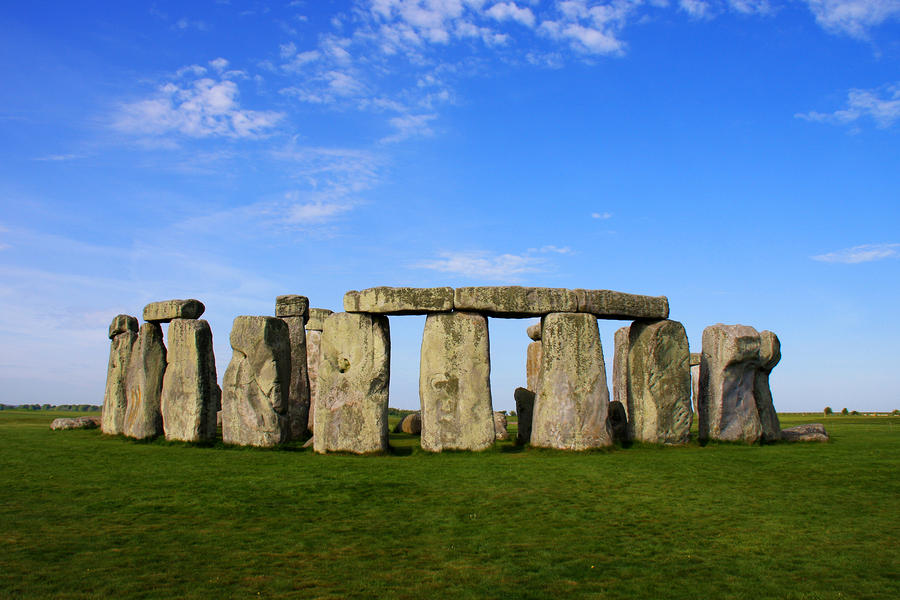One hundred years ago this week, Cecil Chubb of Great Britain decided to give his wife a really great gift. He bought her a bunch of big rocks at auction for £6,600 (equal to US$10,500 in 1915 and about US$250,000 today).
Mrs. Chubb was certainly surprised with the thoughtful gift. But the rocks just weren’t her cup of tea.
You see Mr. Chubb bought Stonehenge for his wife. Yes, that Stonehenge. The prehistoric, 4,500 year old huge dominoes.
After a few years of “what am I supposed to do with these?” from his wife, Cecil finally donated it to the nation and for the last century, Stonehenge represents a historic landmark for the United Kingdom and the world.
I have to be honest with you, today’s blog post is reverse-engineered.
The one hundred year old story of Cecil Chubb and Stonehenge was so funny that I decided to mention it and then figure out a good way to make a meaningful point for authors and publishing colleagues.
In effect, to get water from a Stonehenge.
It was not easy.
Here are a few options I pondered:
1) Never give a book to someone without asking yourself if they would really want to read something like it.
2) Everyone makes mistakes, so if your book doesn’t sell, just donate them to someone.
3) If the initial audience for your book rejects you, maybe there is a bigger audience waiting for it.
None of those really worked for me, so here is what I came up with:
Classic literature takes time before it is called classic.
In 1915 the people of Great Britain didn’t know what they had. The person who sold Stonehenge thought so little of the site that when they sold it to Cecil Chubb they probably laughed all the way to the bank thinking about how they suckered him.
Conversely, knighting something an “instant classic” is almost always untrue. I would suppose the “new” Harper Lee and Dr. Seuss books that released this past summer could be called “instant classics,” but considering two exceptions to the classic-rule among the hundreds of thousands of books published this year is hardly a reason to change the standards.
The definition of a “classic” is that a generation or two from now people would still read it and consider it worthwhile. The path to classic is not paved by marketing or promotion, but by readers who consider it worthy of their time from generation to generation.
Classic status is bestowed by readers.
Society in general is quick to assign long-lasting fame or “classic status” to everything from movies to a particular sports game or to a song or book.
But only time will tell if that is truly the case.
Twice each year I blog about what was on the various bestseller lists years ago. For instance, back in late June, I posted the lists from July 1995.
Only because I feel that more time needs to pass before classic status is assigned I would say only Christy by Catherine Marshall currently could be given that description from among the 1995 bestseller list. However, we can probably place a few more on a “watch list” as classics.
The things that make a book a true classic are either some or all of the following:
- Started a trend that continues to today.
- Is still top-of-mind when groundbreaking books are mentioned.
- Continues to sell well for decades.
- Considered important by educators, librarians and leaders.
Still very subjective, but fun to ponder.
My point today is to reserve the word “classic” to describe a book standing the test of time and not be so quick to grant that lofty description too early. It might take 45 years instead of 45 centuries, but for sure, 45 minutes is far too soon.



 Reviews: The Spread I Like to See
Reviews: The Spread I Like to See

As I read your post a couple thoughts came to mind. First, I didn’t know that little bit of history about Stonehenge (and good luck squeezing water from it. 😉 ). It’s interesting to consider what could have happened had Cecil Chubb not purchased this piece of real estate for his wife.
Secondly, as I thought about your standards for what makes a book a classic, one author and book immediately came to mind. Seeing Francine Rivers at ACFW last week was a gift. So many people talked about how much her book, Redeeming Love, ministered to them and how they’ve passed it on to others over the years. I don’t know if you would consider it a classic, but it definitely deserves to be on the watch list. 🙂
Jeanne, as I read Dan’s post, Redeeming Love is the book that came to my mind, too. Still read, talked about, shared, and “relevant” (not crazy about that word, but it fits here) years later.
There are some exceptions to the rule against ‘instant classic’; I’m reading one now. It’s “First Light”, Geoffrey Wellums account of his experiences as a fighter pilot in the RAF.
Published in 2004, it was clear that it would be in the forefront of memoirs within its own sub-genre. The writing is so lucid and lyrical, and it sets a sense of place so well that the passage of time was not needed to make that judgement.
There are some significant factors involved, not the least of which is the fact that the subject is both popular and well-populated by similar works; Wellum stood on the shoulders of giants, as it were.
He also had the advantage of hindsight, that the events he describes could be imbued with a meaning they could not have had at the time.
And most of all, he’s a superb writer. He poured his life and soul into “First Light”.
Good thought. Belongs on a “watch list.”
Very few books remain active and available for purchase 15-20 years after they release. Very few.
We need someone to invent time travel.
I’d line up right behind Jay Gatsby as we look to beat on, boats against the current.
Ah, I had my time travel direction switch on the wrong setting. Oops.
Dan, I simply have to say it: “Today’s post really rocks!!!”
You feel pretty good about that response, don’t you? 🙂
I tried to be different so you wouldn’t take me for granite.
It’s interesting to look at some of top books of all time, and see how many you even recognize; The Ginger Man has sold over 50 million copies, but I bet most people remember it–despite the controversy it caused when it was published. Even looking at some of the greatest writers of all time, you have to wonder what made one book a classic and another…not so much; Martin Chuzzlewit was a fantastic book with great characters–perhaps one of Dickens greatest works…yet it’s largely forgotten.
It’s not only Redeeming Love that has achieved true classic status among Francine Rivers’s books. While it has the #2 paperback rank today in both romance and historical categories of religious and inspirational fiction on Amazon, her Mark of the Lion Series is also classic (A Voice in the Wind at #49 and #56 in the same categories, An Echo in the Darkness at #37 in general historical fiction, and As Sure as the Dawn at #68 in historical religious and inspirational). All were written 20-25 years ago. Classics all! I love the way each so realistically portrays the struggles involved in being faithful under great pressure and in coming to faith from hardened unbelief. Just imagine how many people have started reading because they heard it was a great book and were transformed either by deepening in their faith or by deciding to follow Jesus themselves for the first time. What an impact and so much more to be treasured by an author than any Amazon rating or listing as a classic of literature. In the eternal economy, one saved soul trumps millions in royalty income every time.
I’d add Frank Peretti’s This Present Darkness as another classic. Published 9 years earlier in 1986 and still #3 on the 1995 list, today it’s still at #6 in Christian science fiction paperbacks and at #57 as paperback and #21 on Kindle in Christian mystery/suspense. It transformed my own understanding of Eph. 6:12 “For we are not contenting against flesh and blood, but against the principalities, against the powers, against the word rulers of this present darkness, against the spiritual hosts of wickedness in the heavenly places.” If you haven’t read it, I recommend you do so. It might give you a different and more biblical perspective on current events.
Dan,
Great article! Much to ponder. Long ago…okay not really that long ago, I bought my wife a set of luggage for a “romantic holiday occasion.” I wanted the gift to say honey, you deserve to travel well. I really thought I hit the mark on that one. Okay, looking back I see it now. I think it came across more like you should take a trip.
Thanks for helping me feel better today about my stupidity.
Maybe “Carhenge” in Alliance, Nebraska is for sale? Or maybe you could bring your wife to it?
We could use that luggage, I bet she’d like that!
Classics – I always think fondly of Nathaniel Hawthorne who thought of himself as a failure as a novelist, but didn’t have a clue that one day every high school student in America would have to write reports on his books….
Excellent point. Time has a way to change perception. Not every book we consider a classic today was highly thought of shortly after it was published.
Art is like that.
Dan, you reinforced a very salient point with your immensely entertaining tale of Stonehenge.
In 2001, I was attending one (of many) land auctions that was put on by a large natural resources company (mining). This particular auction was,of about 70 assorted land parcels. I ended up buying the love of my life a piece of land that was quite unloved, MUCH LIKE Stonehenge.
The way the auction worked is that you bid a per acre price with the highest per acre bid having the right to choose which parcel(s) you wanted then applying the per acre price to the parcels acre size to determine the final price plus any (usual) closing costs. Then another round of bidding would ensue with the highest bidder making their selections and so on until all properties were sold.
To make a long story short 69 properties were sold and no one bid a per acre price on the last remaining parcel. This was going to be the next (and last) round. There were hundreds of people there and I had already acquired some hotly bid on land. With no one bidding the auctioneer finally asked “won’t someone bid something for this last piece of land”. Everyone looked around at each other silently until some one finally spoke up and yelled out a very low bid, it was me. Much to my surprise nobody would bid a cent higher over my bid, no one. This parcel was truly unloved (or reserved for only one person by Our Lord).
So I won the bid and presented it to the love of my life as a fully paid gift for her impending birthday. She was pleasantly surprised at such an unusual and novel gift. The outcome fourteen years later? She is still the love of my life as well as now my much cherished wife. Recently, a nationally known energy company offered her fifty times the per acre price I paid, calculated on a price per acre offer to sign a 5 year oil and gas lease PLUS a generous royalty share payout every month for years to come. This will be her first oil and gas deal. (I have other property in the area that I bought this way that I have already leased out to petroleum interests in the same manner).
So for fourteen years she dutifully paid taxes on the land while it had seeming little financial value other than to perhaps graze cattle on. At the time I was making these land investments I hadn’t even given a single thought about potential worth of the mineral rights, no one I knew of was. Years later came the discovery of a new way to extract gas and oil. My wife always valued this property regardless of current perceived value and wouldn’t part with it because it was given to her out of a sense of generosity and love as a younger single woman.
Soooooooo, whether you fully realized it or not, your blog title couldn’t have been more pertinent and your story of Stonehenge isn’t nearly as whack as someone might think. This was indeed a surprise even if it took fourteen years to manifest itself.
This situation made me think of some writers as a metaphor to my wife’s land. Seemingly near worthless (as writers, not persons) year after year with little attention paid to them and then spectacularly bursting forth in new discovery and great value in their (and Our Fathers) own time.
Ecclesiastes 3 [Full Chapter]
For everything there is a season, and a time for every purpose under heaven: a time to be born, and a time to die; a time to plant, and a time to pluck up that which is planted; a time to kill, and a time to heal; a time to break down, and a time to build up; …
A great post. Thanks.
I feel Mr. Chubb’s pain, except that my wife says, “What were you thinking?’ It’s happened more than once. Next time I’ll tell her she’ll just need to give my gift a few years in order to appreciate it.